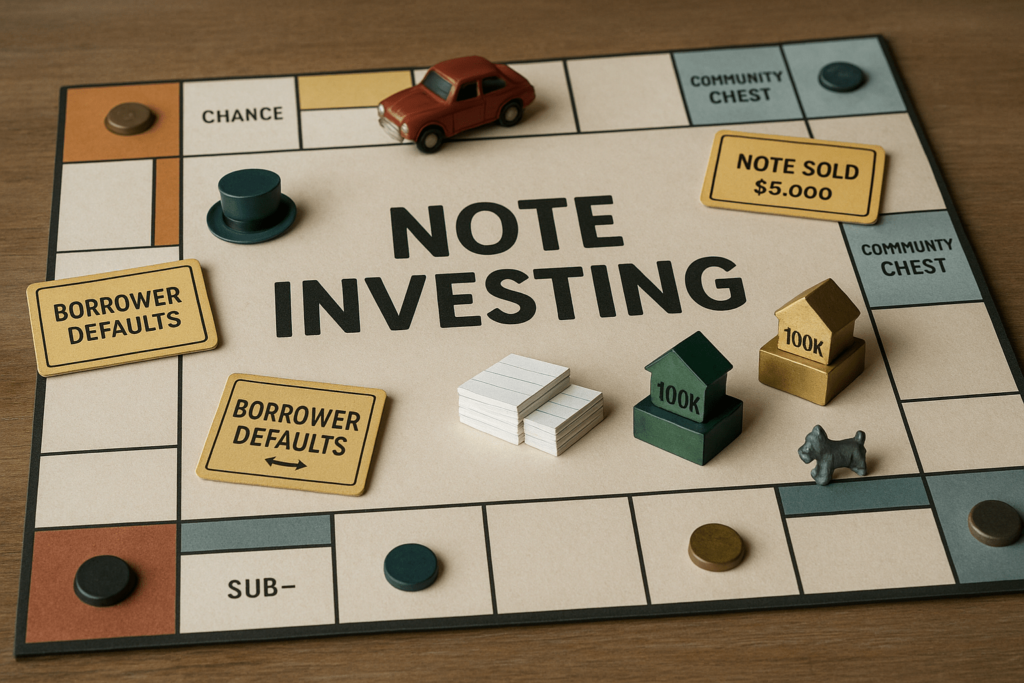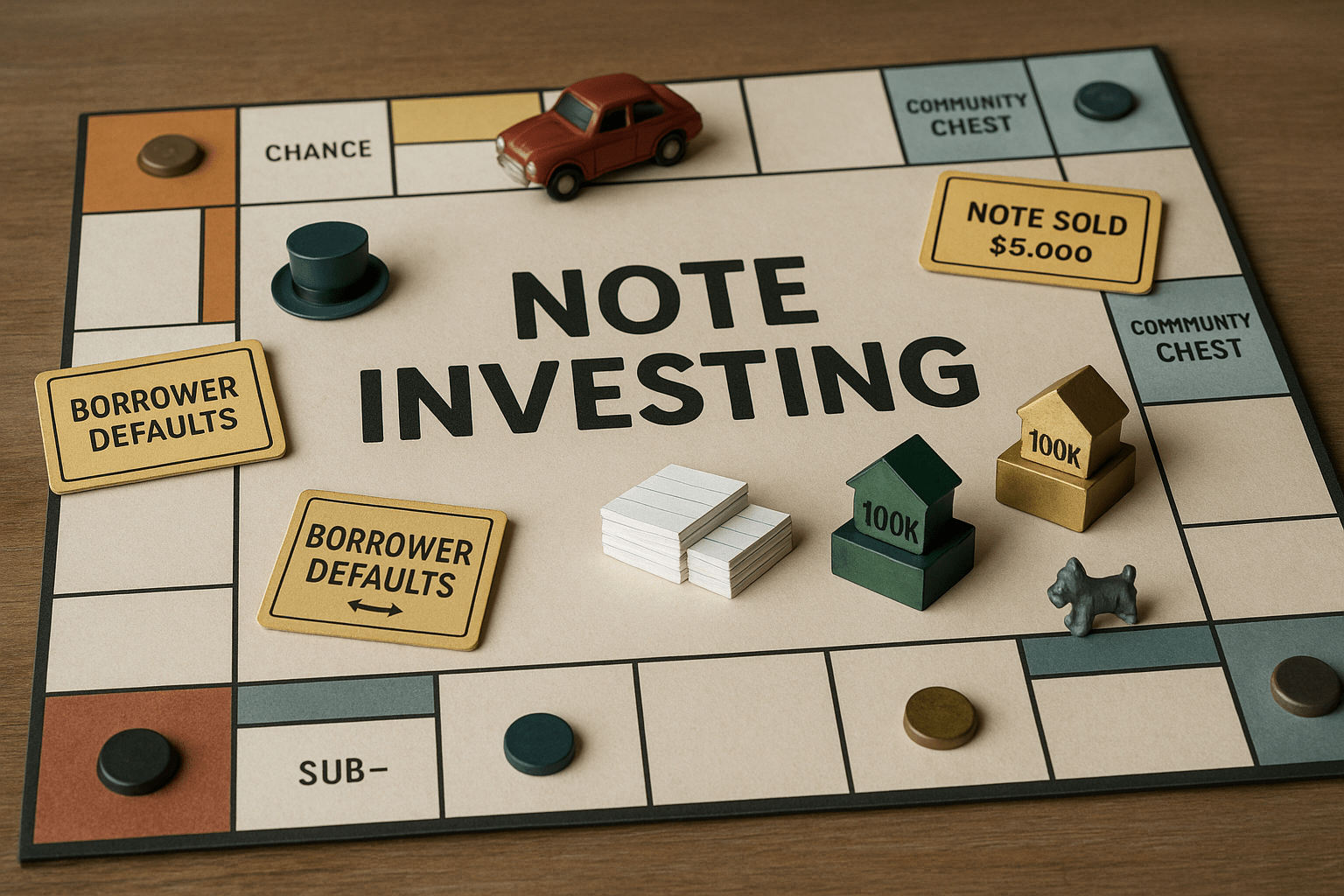If you’ve ever been handed a stack of papers with the word “mortgage” stamped all over them, congratulations—you’ve been initiated into the world of promissory note buyers. But here’s the twist: that paper is more than just a record of your loan; it’s an asset. And when promissory notes are generated from private party loans, they become assets. Where there are valuable assets like promissory notes, there are promissory note buyers. Enter the fascinating universe of companies that that are promissory note buyers.

Why We Are Promissory Note Buyers and What We Actually Do
Think of it like a game of Monopoly, but with real money and actual properties. A promissory note is a legal IOU between a borrower and a lender, promising to pay back a loan under specific terms. Companies that buy these notes aren’t collecting on your debt like some shadowy movie villain; they’re purchasing the right to receive your loan payments.
Why? Because it’s a strategic investment. Just like investors buy stocks or bonds, note buyers are banking on a steady stream of payments—sometimes at a discount to make the deal sweeter.
Why Would Someone Want to Sell Their Promissory Note?
Good question. There are many reasons someone might want to sell their note. Whatever the reason, it generally falls under one main umbrella. Think of it this way. Imagine you’ve just sold your home with seller financing—you’re thrilled, but instead of a lump sum, you’re left with monthly payments trickling in over 15 or 30 years. Not exactly instant gratification.
Here’s where promissory note buyers come in. They offer you cash upfront—albeit a less than the total loan value—in exchange for those future payments. People sell notes for lots of reasons: to pay down debt, invest elsewhere, pay for medical bills or a serious medical issue, or simply declutter their financial life.
The Role of Note Brokers
Enter the middleman: the note broker who are not promissory note buyers. Brokers connect sellers with buyers, much like a real estate agent links homebuyers and sellers. A good broker knows the ins and outs of valuation, pricing, and negotiation. Think of brokers as financial matchmakers—they don’t usually buy notes themselves but make it their business to ensure a good fit between buyer and seller. The note brokers role is best explained by the phrase you’ve probably heard people say, “I’ve got a guy for that.” Well, he’s the guy. A great example is a real estate agent who is working on behalf of the buyer and the seller; that’s the role of the note broker.
Who Actually Owns Your Mortgage?
You might think you’re sending payments directly to your bank, but surprise—your mortgage note could have been sold (and resold) multiple times. This concept, called the secondary mortgage market, is like a relay race where your mortgage gets handed off to different investors. Why does it matter? Technically, it doesn’t so long as you keep making your payments on time. However, a new note buyer can affect things like where you send your payment and who to contact if issues arise.
Seller Financing Escrow Services: Keeping It Clean
Seller financing is awesome for folks who want to bypass traditional banks, but it can get messy fast. What happens if payments are late? What if the terms aren’t clear? That’s where escrow services step in—neutral third parties that collect payments, track the loan, and keep everyone honest. Well managed companies that buy promissory notes understand the need for a 3rd party servicer to make the transactions smoother for all parties involved.
Mortgage Options for Low Income and Bad Credit Buyers
One of the top reasons seller-financed notes even exist is that traditional mortgages can be tough to get—especially if you have low income or bad credit. But don’t lose hope. Options like FHA loans, USDA loans, or private financing can bridge the gap.
Need Cash? How to Get Money for a Down Payment
You’ve found your dream house, but your savings account says otherwise. Down payments are often the biggest hurdle to homeownership. Some people tap into retirement funds, others get help from family, or look into government assistance programs. And this is also an opportunity to ask the seller if he will do a privately financed promissory note. Not all sellers are willing to work with the buyer to privately finance a promissory note deal. Mainly because they want to get all their money at the time of the sale, not have to wait months or even years for the burrower to pay off the promissory note. Buy it never hurts to ask!
Applying to Buy a House: More Than Just Paperwork
Buying a home isn’t as simple as saying, “I want that one.” The application process involves credit checks, income verification, and (let’s be honest) a small mountain of paperwork. Whether you’re applying for a traditional mortgage or a private financing deal with the seller, understanding what lenders look for can make or break your success.
When Mortgage Payments Become a Struggle
Life happens—job losses, medical emergencies, or unexpected expenses can turn a manageable mortgage into a financial nightmare. Luckily, there are options: loan modifications, government relief programs, or even selling your mortgage note for quick cash from promissory note buyers. In this type of situation, a promissory note can be worth it’s weight in gold.
The Step-By-Step of Buying a House
From getting pre-approved to house hunting, inspections, closing, and moving in, every step matters. We’ll guide you through the entire journey, ensuring you know what to expect before signing on the dotted line.
Why Understanding Promissory Notes Matters
Whether you’re a seller looking to cash out, a buyer hoping to break into the promissory note buying world, or just a curious homeowner, understanding promissory notes and the companies that buy them .gives you insight that not many have.
For sellers, it’s a way to unlock cash quickly. For buyers, it’s an alternative way to invest in real estate without the hassle and associated risks of owning property. And for everyone else? It’s a peek behind the curtain of how the note buying scene really works.
Wrapping It All Up
Companies that buy promissory notes play a pivotal role in the real estate ecosystem, helping sellers offload long-term loans and giving investors access to predictable returns. While selling your note isn’t the right move for everyone, understanding your options puts the power into your hands.
Stay tuned for deeper dives into each of these promissory note topics!

